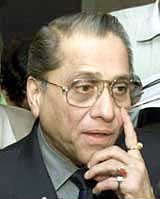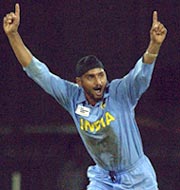Home > Cricket > World Cup 2003 > Interview > Jagmohan Dalmiya
'We must work on the reserve bench strength'
March 21, 2003
 There is little doubt that Jagmohan Dalmiya, president of the Board of Control for Cricket in India, is singularly responsible for making the game hugely profitable. As president of the International Cricket Council, he transformed cricket from a comfortable business proposition to a lucrative enterprise, almost on par with games like basketball and football.
There is little doubt that Jagmohan Dalmiya, president of the Board of Control for Cricket in India, is singularly responsible for making the game hugely profitable. As president of the International Cricket Council, he transformed cricket from a comfortable business proposition to a lucrative enterprise, almost on par with games like basketball and football.
On the eve of the World Cup final, Dalmiya, arguably the most powerful figure in the sport, spoke to Cricket Correspondent Ashish Magotra in an exclusive interview.
In your second tenure as BCCI president we have seen a lot of changes. The contract system will come in soon and the pitches are being upgraded. What other measures are you planning?
We have reached this level due to our efforts and it is very important to sustain our efforts. It should not be a one-off thing. We must work on the reserve bench strength. Your team may be the best in the world but that is only a temporary phenomenon. We have to ensure that the supply line continues. We have to make sure that 'A' teams
are sent all over the world, we have to give the players international exposure.
Youngsters are suddenly put into international cricket and they do not know what is happening. After two games, naturally the selectors can't afford to keep them in the team. Physical fitness has become very important and we are starting from the grass-root level. What was happening earlier was that the players would come into the Indian team after scoring a few centuries or taking a few wickets. They were suddenly introduced to physical fitness and before they could adapt they found themselves on the injury list. So we have to introduce the fitness culture in the under-17, under-19 teams. We have the best players in the world and we need to continue that.
In South Africa, every cricket stadium has practice facilities, indoor nets. There are cricket academies in every province. Can we expect something like that in India?
That is bound to come in. We have been spending lavishly in a bid to develop the infrastructure in India. We have taken a decision to provide floodlights to all the practise facilities at all grounds so that players can practise at night as well. Various programs are in place and we are seeing the results.
 The MRF Pace Academy had been very successful but in recent years its influence seems to have waned. Are such academies being planned all over India?
The MRF Pace Academy had been very successful but in recent years its influence seems to have waned. Are such academies being planned all over India?
We are planning a few things, let us see what happens. One idea I have is we should have a spinners academy. We have the best spinners in the world and before it is too late and our top spinners are too old to train the boys, we must have a spin academy.
Bangladesh became a Test playing nation when you were ICC president but they seem to be struggling in international cricket. Have you considered inviting Bangladesh to play the Ranji Trophy?
This is a time when the team is going through a transitional period, like Pakistan. This is not the first time it has happened. New Zealand, who got Test status in 1926, took some 28 years to earn their first Test victory. India first visited England in 1928 and we won our first game abroad in 1951. So maybe at the moment they don't have the players but they will slowly come up.
Do you think the international media is overdoing its criticism of Bangladesh?
Of course, they are overdoing it. It is motivated. They deserve to be here and their consistent performances earned them Test status. In the last World Cup, what Kenya has done in South Africa, they did all that. They defeated Pakistan; they caused the biggest upset in the 1999 World Cup.
You expressed the view that England should have been docked 4 more points after they conceded their match against Zimbabwe.
It was not fair. When England conceded the match, they were effectively 0 runs for 10 wickets. So how can they have the same run rate?
What progress is being made on the resumption of India-Pakistan games?
The government has given us permission to play the Asia Cup, We have already played each other in the junior World Cup and we have been participating in other tournaments. We will play them only in multilateral tournaments.
There was a lot of talk about player contracts but it has all died down.
No, it has not died down. It is absolutely in the offing. The question came up as to how much money the players should get. During the Sri Lanka tour, I mentioned the players would get the highest, 26%. Then there was talk about how much the domestic and international players would receive and we said 50/50. Now that the finances have been worked out, we only need to sit with the players and discuss the issue. We should have contracts in the next couple
of months but we need to sit with the players and sort out the matter.
What incentives will the team receive for their performance in the World Cup?
The prize money they are winning, all of it. The logo money. Getting into the semi-final, each player gets Rs 12.5 lakhs. For reaching the final, the amount is doubled to Rs 25 lakhs. If they win the title the sum is doubled again to Rs 50 lakhs. They deserve every penny of it. The Board gets nothing out of it.
Who do you pick to win in Sunday's final?
Only India. As far as ODIs are concerned you never know what will happen on the day. ODI cricket is a different game and the team that performs on the day wins. On paper, Australia was better in batting, bowling and fielding. Today, they are nowhere near our batting, our fielding is equally good, they have McGrath, Gillespie, Bichel and Lee but our bowlers have not done too badly either. They don't have the quality spinner we have. We are winning.
More Interviews